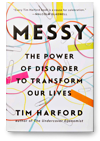When we think of being productive or creative, we tend to think it requires a deep focus. You want to be good at something? Then you've got to put in the work. But it might not require as much singular focus as we'd imagine. British journalist Tim Harford has uncovered a surprising aspect of creative longevity in his critically-acclaimed book Messy. Ranging expertly across business, politics and the arts, Harford makes a compelling case for the creative benefits of disorganization, improvisation and confusion.
According to Harford, the common denominator for creative minds is that they refuse to sit still. It's what makes for successful polymaths (those interesting individuals with a wide range of knowledge and skills). These people practice what he calls "multi-tasking in slow motion", where people move between numerous projects in rapid succession. Otherwise known as crop rotation, you might think of it as a high intensity workout for your life.
And just like those workouts keep your body and muscles guessing and engaged, so too does this crop rotation. It seems messy and unfocused, but in reality, it's the secret to never getting bogged down and bored. "From the music studio of Brian Eno to the Lincoln Memorial with Martin Luther King, Jr., from the board room to the classroom, messiness lies at the core of how we innovate, how we achieve, how we reach each other," says Harford. "In short, how we succeed."
It's in those unexpected changes of plans, those spontaneous collaborations with unfamiliar people that new ideas are generated. Harford's findings align with the work of Bernice T. Eiduson, who in the 1960s examined why some scientists had a greater impact than others. What she discovered was that it didn't matter the scientists' age or their health. What mattered was how often they changed the subject they were researching. Instead of finding that the world's greatest scientists were specialists, Eiduson uncovered the surprising fact that they changed subject not once or twice, but an average of 43 times during their careers. It was these moves that constantly refreshed and challenged their knowledge, ensuring they didn't lose interest and enthusiasm in what they were working on.
The take away here is that introducing a little more crop rotation into your daily life and work is the key to staying engaged, enlightened and thinking creatively. Change up your focus, step out of your comfort zone and you'll unlock all sorts of hidden benefits.
Volume 10 // 2018
31 Days is back ... And 2018 marks its tenth iteration. When we started this a decade ago, we never imagined that these daily guides to being better men would take off and become one of Valet.'s most popular series of all time. So thank you for your continued support and belief in our mission. This year, we're focusing on productivity—ways in which you can streamline and improve your days to make your job less stressful, your work more efficient and your life run just a bit more smoothly. It's time to raise your game.
-
1Get a Jump Start
on Your Day -
2Slow Day?
Energize! -
3The Power of
Saying "No" -
4Faster Haircut =
Better Haircut -
5Casey Neistat on
Productivity -
6Weatherproof
Your Sneakers -
7Save Money
Traveling -
8Work
Slower -
9Stay in
Shape -
10The "Good Day"
Drug -
11Get Bumped ...
for Good -
12Tim Ferriss on
Doing It All -
13Essential
Style Hacks -
14Get a
Raise -
15Get
Shit Done -
16A Successful
Morning -
17Change
Your Focus -
18Streamline
Your Grooming -
19Jeff Bezos on
Making Decisions -
20Fixing a
Bad Haircut -
21Learn a
New Hobby -
22Dress for
Success -
23Success at
Any Age -
24Sell
Yourself -
25Get Out of
a Meeting -
26Jay-Z on the
Keys to Success -
27Bad Breath
Hacks -
28Master Your
Credit Cards -
29Productivity
Myths -
30The First
5 Minutes -
31Be Better at
Flirting



